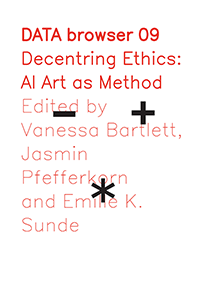Decentring Ethics: AI Art as Method
edited by Vanessa Bartlett, Jasmin Pfefferkorn and Emilie K. Sunde

- DATA Browser
- Published: 2025
- ISBN: 978-1-78542-155-6
- PDF ISBN: 978-1-78542-154-9
Artists and cultural institutions are a vital force in the construction of a relational, collectively held ethics of human-machine assemblages. Technological change always out-paces ethical governance, producing an uncertain zone between what machines can do, and what is upheld as ethical by diverse publics. Working in ways that are often speculative and provocative, artists trace ethical tensions as they are emerging in public consciousness.
AI ethics developed by big tech has been critiqued for its performativity and lack of equity. Working in the gaps left unfilled by recent developments in national and international policy, this volume explores artists’ and curators’ radical visions for who or what requires ethical protection. This volume pushes past regulatory obligations and towards ethics as a way of being in the world.
The book advances a decentred approach to ethics. It draws on non-Western, ecocritical and feminist worldviews, and acknowledges the more-than-human as an agent with the capacity to act. We position AI art as ‘method’ – a process of working with, or in response to, the contemporary computational era. This expands the normative definition of AI art as art created with relative autonomy by computers. AI art as method frames ethics as situated, embodied and improvisational, whereby artists work with emergent ethical questions while challenging the more conservative frameworks of the cultural institutions they operate within. While AI art often utilises the materiality or software of machine learning, this is not a pre-requisite for AI art as method.
The book contains commissioned essays, in conversation pieces and artistic interventions, compiled by Vanessa Bartlett, Jasmin Pfefferkorn and Emilie K Sunde. It includes contributions by: Dani Admiss; Aarati Akkapeddi; Nora Al-Badri; Vanessa Bartlett; Gabby Bush; Sean Cubitt; Xanthe Dobbie; Solange Glasser, Ben Loveridge, Margaret Osborne, Lucy Sparrow, and Ryan Kelly; Libby Heaney; Helen Knowles; Jeannie Marie Paterson; Jasmin Pfefferkorn; Off Site Project; Iyad Rahwan; Kamya Ramachandran; Tyne Daile Sumner, Emilie K. Sunde; Amanda Wasielewski and others.
The volume extends the work of AAIDE (Vanessa Bartlett, Gabby Bush, Jasmin Pfefferkorn, Tyne Sumner and Emilie K Sunde), based at The Centre for AI and Digital Ethics, University of Melbourne (2021-2024).
Editor Bios
Emilie K. Sunde is a PhD candidate in the School of Culture and Communication at The University of Melbourne. Her dissertation is a conceptual thesis photography theory, computation, and AI-images. She is currently developing a project that draws on an eco-critical approach to the latent spaces of Generative AI models, to develop a shared language of latent space between STEM and HASS disciplines. She is also the co-founder and director of the research group CODED AESTHETICS.
Vanessa Bartlett is a curator and interdisciplinary research leader. Drawing on her own lived experiences, she explores how medical and technical systems shape equity, ethics and social justice, particularly for disabled and chronically ill folk. Her curated exhibitions exploring the psychosocial impacts of digital cultures have been seen at international arts spaces such as FACT (Foundation for Art and Creative Technology), UNSW Galleries and Furtherfield and have featured in The Guardian, Creative Review and BBC Radio 4. She has edited two books for award-winning academic publisher Liverpool University Press, the most recent of which was co-edited with Professor Henrietta Bowden Jones, one of the UK’s most high-profile neuroscience researchers. She leads several collaborative creative practice projects including AAIDE: The Art, AI and Digital Ethics research collective at The Centre for AI and Digital Ethics University of Melbourne; and Stomach Ache, which explores the gap between emerging microbiome science and lived experiences of digestive dysfunction through curatorial methods. She was Mckenzie Postdoctoral Fellow in the School of Culture and Communication (2020-2023), and is currently a Research Fellow in the Faculty of Law, at University of Melbourne.
Jasmin Pfefferkorn is a Melbourne Postdoctoral Fellow in Culture and Communication at The University of Melbourne. She is currently researching the impact of generative technologies on museums’ practice. Her research is at the intersection of critical AI and museum studies, with an emphasis on the relation between technics and culture in emerging socio-cultural milieus. She also has expertise in affect theory, assemblage systems theory, media studies, aesthetic theory, and visual culture. Jasmin is the author of the monograph Museums as Assemblage (Routledge, 2023). She is also the co-founder and director of the research group CODED AESTHETICS, which takes an experimental approach to exploring human-machine entanglement in sensing and sense-making.
